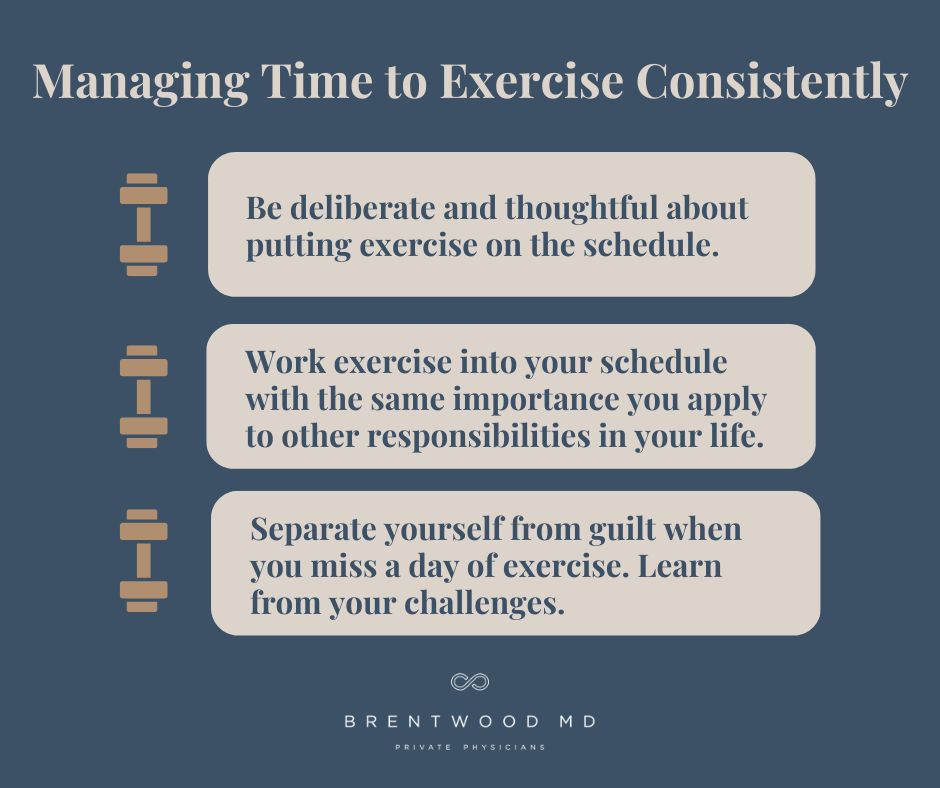I’ve spoken before about the five foundational elements of health — one of those is exercise. When I talk about exercise with my patients, I talk a lot about how our bodies were created to be active. Our metabolic systems, our hormones, our tissues — whether they’re muscle, fat, or skin — were all created to move.
Now, I acknowledge that in the last few decades, our lifestyles have changed. A lot of professions have become less active. Many of my patients are either working from home or doing a lot more work online. In the past, they may have walked to work or climbed stairs to get to a meeting, but over the past three years, these small changes have become more pronounced.
The thing is, because our bodies are created to be active, there’s inherent danger when we become inactive. Our body fundamentally changes. There’s a disruption in our metabolic processes, our body’s composition, and our hormone levels.
I like to look at these changes from an athletic perspective: that is, we become what we train our bodies to be. If we train our bodies to be inactive, our internal systems are going to adjust to that inactivity. This leads to the complications I mentioned, but it also makes it more difficult to become active.
Our bodies respond to our routine. When we initially start exercising, we might feel mentally and physically fatigued. But we have to acknowledge that as we start a new program, our bodies are not adequately prepared. We have to intentionally train our bodies and make physical activity the norm.
Why Don’t People Exercise Regularly?
When it comes to exercise, I encourage my patients to separate the terms “excuses” and “reasons.” To me, the word “excuse” has a negative connotation, and we have to acknowledge that many of the reasons people don’t exercise are real and worthy of consideration. Do any of these statements sound familiar?
“I don’t have access to equipment.”
“I’m not interested in going to a gym — it sounds boring!”
“It’s been so long since I was active. Everything I used to do seems so hard.”
And, by far the most common:
“I just don’t have the time to exercise consistently!”
Are These Reasons Legitimate?
These are all completely valid statements — but we need to reevaluate our responses to the challenge of exercise.
Some people are really mentally and physically lit up by exercise. It’s a part of who they are. But for the majority of people, it’s a commitment. It’s something to work on — or maybe even work through — that you may never find joy in. Still, you have to recognize it as necessary to improving your health and lifespan.
These challenges aren’t impossible to overcome. Sure, gym memberships and equipment might not always be available, but there are plenty of cardio and bodyweight strength options for you to keep up with your fitness on the road. Find exercise boring? Fitness doesn’t have to mean picking up heavy things for hours on end. There are plenty of recreational sport and group fitness options.
And here’s the big one: time constraints. Sure, we’re all busy, but it’s your response to your busyness that determines whether you’re making an excuse. At the end of the day, it’s up to you to focus on the solution instead of the problem.
Time Management, or Time Availability?
We all have the same number of hours in a day. I know that sounds like a cliché, but it’s true. It’s how we prioritize our time that makes a difference.
We all have different priorities — both in our daily lives and in our health care. We have to look at the big picture to determine if there’s any margin that isn’t aligned with our priorities.
I’ll never tell members how to arrange their priorities, but I do encourage them to view their health as a foundational asset that deserves time, just like work and family. It’s all about figuring out how to balance your health with your other priorities, because enhancing one area of your life is bound to make the other areas more fulfilling.
For example, exercise can offer great energy, mental clarity, and reduced stress. If we’re able to apply those three little features to the workplace, we can become more productive, fulfilled and achieving.
Enjoying that success at work can help us achieve the financial freedom needed to enjoy more time with our family. In the end, those enhanced relationships all started with exercise.
How Can We Better Manage Our Time to Exercise Consistently?
We all have a tendency to squeeze our health into our schedules around other responsibilities. In my opinion, it should be the other way around. We need to be deliberate and thoughtful about putting exercise on the schedule, and possibly even putting it down first before fitting in other things around it.
This approach isn’t exclusive to exercise — this health-first focus applies to the other five foundations I mentioned earlier, but some of them are a bit more routine than others. For example, your nutrition is a required part of your routine — forced by hunger and a need for energy. In contrast, exercise is often the opposite. You’ve got work, and a meeting, and something with the kids, and then you’re so exhausted you just want to go to bed. Exercise wasn’t forced upon you, so it often doesn’t happen.
I challenge you to work exercise into your schedule with the same importance you assign to other responsibilities in your life.
At the same time, I encourage patients to separate themselves from the guilt they feel when they miss a day of exercise. Some days other priorities win out, and that’s okay. Learn from your challenges and develop a strategy to keep health a priority on a consistent basis.
For example, Wednesdays are my busiest day. I know I won’t always fit in my exercise routine. But with proper foresight, I intentionally take time on Tuesdays and Thursdays to develop consistent exercise patterns.
How Do You Start Prioritizing Exercise?
Prioritizing exercise starts with changing your mindset. You need to remember why you’re exercising to overcome that initial challenge of making it routine.
It’s very similar to how we treat financial planning. In both our finances and our physical health, the immediate result can be painful. When it comes to financial planning, it hurts to pay an expensive annual premium to an insurance policy, and when it comes to starting a new workout routine, we get sore muscles and fight fatigue.
But life insurance gives us peace of mind — if something horrible happened to us, we know our family would be taken care of. Similarly, if we exercise, we know we’re promoting our wellness in the long term. We’re taking care of our future selves.
Reevaluating your priorities and living them out is a huge part of your greater purpose in life. Fear of a bad future outcome is only a temporary motivator. You need to get in touch with how your long term health plays into your purpose. How you manage your time determines how you live out that purpose.
There isn’t a single purpose out there that doesn’t have exercise innately tied to it, because exercise is so integral to caring for oneself and enabling you to perform at your best.

Dr. Wright joined Brentwood MD in 2022 as the model allows him to spend more time connecting with patients and build a foundation of exceptional care. He is a Nashville native and completed his family medicine residency at the University of Tennessee Health Science Center, where he also served as Chief Resident. He believes that your health deserves a prominent position on your priority list, and would be honored to serve you and your family.








